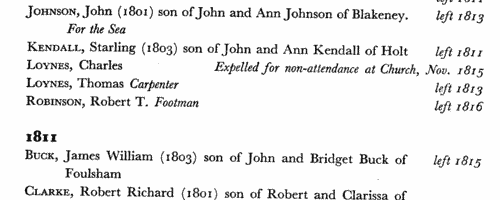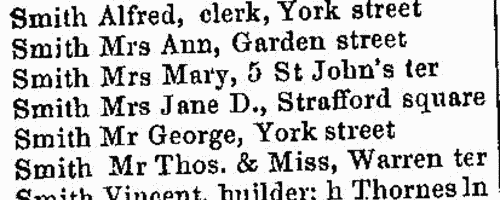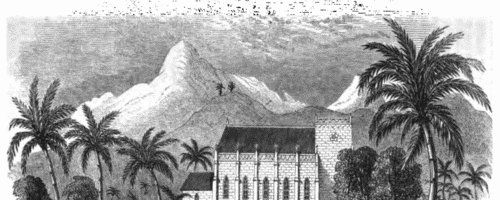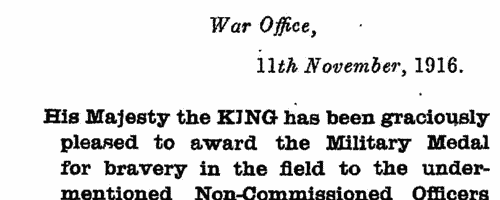Otty Surname Ancestry ResultsOur indexes 1850-1950 include entries for the spelling 'otty'. In the period you have requested, we have the following 6 records (displaying 1 to 6): Buy all | | | Get all 6 records to view, to save and print for £30.00 |
These sample scans are from the original record. You will get scans of the full pages or articles where the surname you searched for has been found. Your web browser may prevent the sample windows from opening; in this case please change your browser settings to allow pop-up windows from this site. Boys entering Gresham's School
(1853)
The Sir John Gresham Grammar School at Holt in Norfolk was founded by sir John, who bought the manor house there in 1546 to convert it into a school, and building work had started by 1555. To celebrate the quatercentenary in 1955, a history of the school written by the Reverend C. L. S. Linnell was published, together with an Alumni Greshamienses, a register of boys entering the school from 1562 to 1954, compiled by A. B. Douglas. The materials to hand for the register for the early years were slight; the first coherent lists of boys survive only from 1729, and then are fitful, with little detail, and largely missing from 1784 to 1803; however, from 1810 onwards the names of boys' parents are usually recorded. The register is arranged chronologically by year (and from 1900 by term - L, Lent; M, Michaelmas; S, Summer), and then alphabetically by surname (in capitals) and christian name(s). Where known, year of birth is then given (in brackets), names, addresses and occupations of parents. From 1900 onwards there are italic abbreviations for sporting achievements at school (h, hockey colours; VIII, shooting colours; S, first-class swimmer; XI, cricket colours; XV, football colours), and p for house prefect and P for school prefect; then (in italics) information about the boy's adult life, and his address (where living) at the time of publication. Finally, on the right hand side of the page, in italics, is given the year of his leaving the school. Most detail is absent before 1810; and, of course, for the boys still at school in 1955, or only recently left, there are no details of future career; nor are there the usual details about their parentage. From 1898 onwards day boys are noted with an italic D (N means Newquay dayboy); and from 1900 onwards the school houses are shown (B, Bengal Lodge; F, Farfield; H, School House or Howson's; K, Kenwyn; O, Old School House; W, Woodlands); and, for the junior school, c, Crossways; k, Kenwyn; o, Old School House).OTTY. Cost: £4.00.  | Sample scan, click to enlarge

| Inhabitants of Wakefield, Yorkshire
(1853)
William White's directory lists traders, farmers and private residents in the area.OTTY. Cost: £6.00.  | Sample scan, click to enlarge

| Missionary donations from Hampshire
(1855)
The Congregational and a number of other independent churches together formed the Evangelical Alliance, committed to promoting and supporting missions to the heathen. The areas chosen for their projects were Guiana, South Africa, India, the South Seas and China. The work of the missionaries was not only in preaching the Gospel, but also in translating the Bible into local languages, and establishing churches, schools and orphanages. Orphans and native teachers were often given the names of principal contributors or congregations back in Britain. In Britain the large amounts of money needed for this work were raised among the Congregational and independent congregations, arranged by auxiliaries for each county (although some contributions for each county might in fact come in from congregations and individuals in neighbouring areas); money was gathered by ministers, at special services, by supporters, and in missionary boxes. The accounts of all these contributions were published as part of a monthly magazine called the Evangelical Magazine. Each issue of the magazine carried obituaries of prominent members of the congregations; general articles on religion; reviews of newly-published religious books; home news, mainly about meetings of importance or interest by the alliance or in individual churches; and then a separate section called the Missionary Chronicle. The Missionary Chronicle was devoted to letters and reports from the missionaries; and concludes with a set of accounts of donations towards the missionary work. This is the index to the donations reported in the magazine, January to December 1855, from Hampshire.OTTY. Cost: £6.00.  | Sample scan, click to enlarge

| Missing Next-of-Kin and Heirs-at-Law
(1880)
The Unclaimed Money Registry and Next-of-Kin Advertisement Office of F. H. Dougal & Co., on the Strand in London, published a comprehensive 'Index to Advertisements for Next of Kin, Heirs at Law, Legatees, &c., &c., who have been Advertised for to Claim Money and Property in Great Britain and all Parts of the World; also Annuitants, Shareholders, Intestates, Testators, Missing Friends, Creditors or their Representatives, Claimants, Unclaimed and Reclaimed Dividends and Stock, Citations, Administrations, Rewards for Certificates, Wills, Advertisements, &c., Claims, Unclaimed Balances, Packages, Addresses, Parish Clerks' Notices, Foreign Intestates, &c., &c.' The original list was compiled about 1860, but from materials dating back even into the 18th century: most of the references belong to 1850 to 1880. For each entry only a name is given, sometimes with a placename added in brackets: there may be a reference number, but there is no key by which the original advertisement may be traced. The enquirer of the time had to remit £1 for a 'Full and Authentic Copy of the Original Advertisement, together with name and date of newspaper in which the same appeared'. OTTY. Cost: £4.00.  | Sample scan, click to enlarge

| Unclaimed Naval Prize Money
(1855-1902)
Various prize moneys were awarded to officers and men who served on board her Majesty's ships. For one reason or another a substantial number of these prizes, from as little as a shilling or two to as much as many pounds, remained undistributed by 1902, when this comprehensive list of the unclaimed moneys was printed: it lists unclaimed shares of prize money, slave and pirate bounties, salvage awards, parliamentary grants, gratuities and other moneys distributed by the Admiralty 1855 to 1902, but which omits moneys for service on the China Station during the war of 1856 to 1880, and special gratuities for service in Egypt (1882), Soudan (1884) and Soudan and Nile Expedition (1884-1885), for which there are separate indexes. In each case the sailor's name is given first (surname, then christian name or initials); rank or rating; ship in which serving at time of capture or award; and the amount due.OTTY. Cost: £6.00.  | Sample scan, click to enlarge

| Military Medal for Bravery in the Field
(1916)
King George V awarded the Military Medal for bravery in the field to these Non-Commissioned Officers and Men 11 November 1916.OTTY. Cost: £4.00.  | Sample scan, click to enlarge

|
Research your ancestry, family history, genealogy and one-name study by direct access to original records and archives indexed by surname.
|








